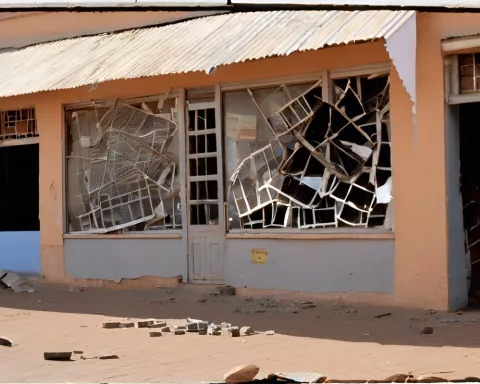In Cape Town, violence and unrest are on the rise, causing fear and uncertainty for both travelers and locals. A recent event in Philippi saw a woman tragically killed and two others severely wounded while entering a minibus taxi. This is just one in a series of violent incidents connected to the taxi sector, with 16 people wounded and seven fatalities in the preceding month. The reasons behind the violence are unclear, but speculation points to internal conflicts within the Cape Amalgamated Taxi Association.
What is the current situation of violence and unrest in Cape Town?
In Cape Town, a growing tide of violence is darkening the daily routine of the populace. Travellers are especially feeling the burden of this instability, with a rising dread clutching those dependent on minibus taxis after a recent shocking event in Philippi. Included among the victims was a lady in her mid-thirties who succumbed to the bullet wounds she received in her upper body. These terrifying episodes follow a sequence of violence connected to the taxi sector that has resulted in 16 people being wounded and seven fatalities in the preceding month.
In the teeming city of Cape Town, a growing tide of violence is darkening the daily routine of the populace. Travellers are especially feeling the burden of this instability, with a rising dread clutching those dependent on minibus taxis after a recent shocking event in Philippi. A woman was tragically killed, while two others were severely wounded as they entered a minibus taxi – a horrifying commencement to the week.
A Series of Disturbing Events
This event was far from singular. Five taxi operators, connected with the Cape Amalgamated Taxi Association (CATA), became casualties of gunfire in three distinct incidents in Nyanga and Delft on the final day of January. Sadly, three lives were claimed, with two survivors currently receiving medical attention, as brought to light by the Daily Maverick.
The targeted taxi was stationed at the junction of Sheffield and Eisleben Roads, accepting passengers, when it was assaulted by anonymous gunmen. The attackers, armed with rifles, rained down a hail of bullets on the vehicle and quickly left the scene, leaving behind a trail of chaos.
Included among the victims was a lady in her mid-thirties who succumbed to the bullet wounds she received in her upper body, as confirmed by police spokesperson Lieutenant Colonel Malcolm Pojie. Two other passengers, a man and a woman, were hurried to a healthcare facility for treatment of gunshot injuries to the face and back, respectively.
Unrelenting Violence
Exacerbating the situation on the same day was the ruthless killing of a 46-year-old taxi driver. He had stopped at a red traffic light at the junction of Klipfontein and Borcherds Quarry Road, his Toyota Quantum stationary, when an unknown attacker in a white Toyota Avanza fired numerous shots at him and made a quick escape.
These terrifying episodes follow a sequence of violence connected to the taxi sector that has resulted in 16 people being wounded and seven fatalities in the preceding month. This series of assaults is causing some to ponder whether the city is teetering on the edge of another taxi war.
Speculations and Responses
The reason behind the recent spike in violent episodes is yet to be revealed by CATA. However, there is widespread conjecture that it might be linked to internal conflicts within the association. In reaction to the shootings, the association has pulled out some taxis from Philippi, Samora Machel, and Delft.
Nkululeko Sityebi, CATA’s spokesperson, voiced their shock at this abrupt and horrifying explosion of violence. He remarked, “We returned from the December holidays only to witness our drivers and operators being murdered.” Sityebi voiced the shared fear and uncertainty now haunting the association’s members, “We are now questioning our safety because we are in the dark about who is doing what and why.”
Sityebi also pointed out that all the violent episodes are happening on a single route under CATA’s management, Seawater, and that the taxis were not operating at full capacity. Evidencing the increasing concern, Sityebi admitted he could not assure the commuters’ safety and stressed that only the police could provide that assurance, drawing attention to the unidentified source of the threat.
The Impact on the City’s Life
The continuous violence and its ensuing fear are undoubtedly casting a gloom over the city’s everyday life, affecting not just the taxi operators but the residents who depend on them. The city anticipates a swift resolution to these incidents, hoping that justice will be served and peace will be reinstated.
1. What is the current situation of violence and unrest in Cape Town?
In Cape Town, violence and unrest are on the rise with a recent event in Philippi resulting in the tragic death of a woman and severe injuries to two others while entering a minibus taxi. There have been a series of violent incidents connected to the taxi sector, with 16 people wounded and seven fatalities in the preceding month.
2. What is the speculation behind the recent spike in violent episodes?
The reason behind the recent spike in violent episodes is yet to be revealed by the Cape Amalgamated Taxi Association (CATA). However, there is widespread conjecture that it might be linked to internal conflicts within the association.
3. What is CATA’s response to the recent violent episodes?
In reaction to the shootings, CATA has pulled out some taxis from Philippi, Samora Machel, and Delft. Nkululeko Sityebi, CATA’s spokesperson, voiced their shock and concern at this abrupt and horrifying explosion of violence.
4. What is the impact of the violence and unrest on the city’s life?
The continuous violence and its ensuing fear are undoubtedly casting a gloom over the city’s everyday life, affecting not just the taxi operators but the residents who depend on them.
5. Is the city anticipating a resolution to these incidents?
Yes, the city anticipates a swift resolution to these incidents, hoping that justice will be served and peace will be reinstated.
6. Can commuters be assured of their safety while using minibus taxis?
Nkululeko Sityebi, CATA’s spokesperson, admitted he could not assure the commuters’ safety and stressed that only the police could provide that assurance, drawing attention to the unidentified source of the threat.












